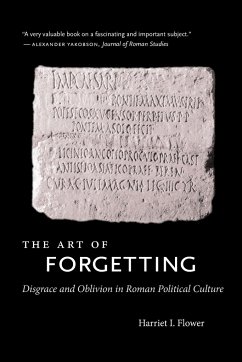Elite Romans periodically chose to limit or destroy the memory of a leading citizen who was deemed an unworthy member of the community. Sanctions against memory could lead to the removal or mutilation of portraits and public inscriptions. Harriet Flower provides the first chronological overview of the development of this Roman practice--an instruction to forget--from archaic times into the second century A.D. Flower explores Roman memory sanctions against the background of Greek and Hellenistic cultural influence and in the context of the wider Mediterranean world. Combining literary texts, inscriptions, coins, and material evidence, this richly illustrated study contributes to a deeper understanding of Roman political culture.
Hinweis: Dieser Artikel kann nur an eine deutsche Lieferadresse ausgeliefert werden.
Hinweis: Dieser Artikel kann nur an eine deutsche Lieferadresse ausgeliefert werden.









